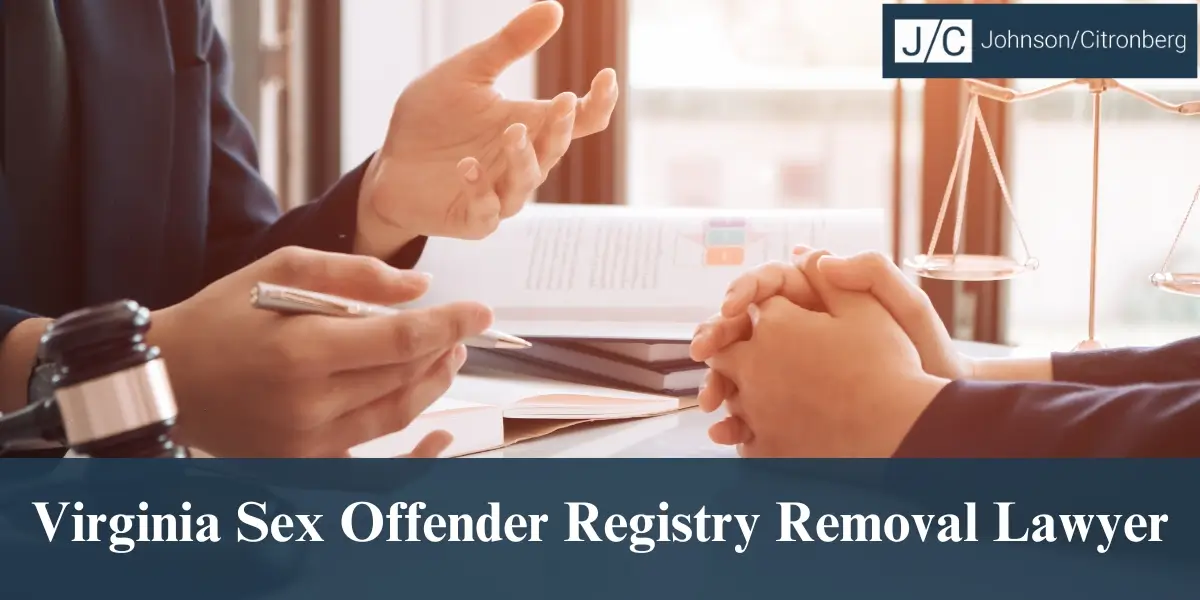Virginia Sex Offender Registry Removal Lawyer
Virginia Sex Offender Registry Removal Attorney
Virginia law allows some individuals on the Virginia Sex Offender Registry to be removed from the registry. Below you will find the eligibility requirements and how the removal process and works in Virginia.
CONTACT JOHNSON/CITRONBERG (703) 684-8000
Virginia has roughly 26,000 people on the sex offender registry. The vast majority of these people are low level offenders who have never and likely will never reoffend. For these people, Virginia provides a pathway to petition the court to come off the registry after a certain amount of time has passed. If you are also need of solution for sex offender register removal case, get the legal add from an experienced criminal defense lawyer. or contact experienced Virginia Sex Offender Registry Removal Lawyer at Johnson/Citronberg, PLLC.

Who Cannot Be Removed from the Registry?
Virginia Code § 9.1-910 details who can and who cannot be removed from the registry. People convicted of a sexually violent offense can never be removed from the registry. This includes rape, forcible sodomy, sexual penetration with an object, and abduction for an immoral purpose. If you are facing charges related to solicitation of a minor, it is crucial to consult with an experienced solicitation of a minor lawyer who can help defend your rights and work towards the best possible outcome in your case. Virginia law also excludes people who have the following from coming off the registry:
- A conviction for a Tier III offenses.
- Two or more offenses which require registration.
- A violation of § 18.2-67.2:1.
- Murder
Who Can Be Removed from Virginia’s Sex Offender Registry?
Virginia law allows Tier I and Tier II to be removed from the registry; however, Tier II offenders must wait longer. Virginia law allows people convicted of a Tier I offense to petition the court to be removed from the registry 15 years after the initial registration date or, if later, the date of conviction for a violation of § 18.2-472.1. Virginia Code § 18.2.472.1 generally concerns registry violations.
For Tier II offenders, one must wait at least 25 years from the date of initial registration or, if later, the date of his last conviction for a violation of § 18.2-472.1 or any felony.
In addition, an individual on the registry cannot file a petition for removal until all counseling, treatment, and restitution has been completed. If you are seeking to navigate this complex process, it is important to consult with an experienced sex offender registry removal lawyer who can guide you through the requirements and help you build a strong case for removal.
What is the Process for Getting Removed from the Registry?
Eligible individuals on Virginia’s sex offender registry can file a petition in the circuit court where the conviction occurred or where they reside, requesting that their name be removed from the registry. The circuit court will obtain the individual’s criminal history from the registry and then hold an evidentiary hearing on the matter. It is important to note that a SORNA (Sex Offender Registration and Notification Act) Violation can complicate the process, and legal representation is crucial to navigate these complexities.
The individual, and any interested persons, can call witnesses and introduce evidence at the hearing. The Commonwealth is also made a party to the petition and can either consent to the petition or argue why it has objections to the individual being removed. To come off the registry, the judge must be satisfied that the person does not pose a risk to public safety.
If the judge orders that the individual be removed from the registry, the State Police will remove the person and his identifying information from the registry. It should be noted that this removal only applies to Virginia. If a person moves out of Virginia or travels outside of Virginia, he will be subject to that State’s laws, which may still require registration.
How to Increase Your Odds of Getting Removed
While each case is different, there are a number of things that you can do to increase the odds of being removed:
- Psychosexual. By undergoing a psychosexual evaluation, you can provide the court with expert testimony that you are a low risk of reoffending. This gives the judge a solid reason based on science as to why your removal makes sense.
- Polygraph. A polygraph can show that you have not reoffended since you were convicted. While these are not always admissible, it can be powerful evidence when used properly.
- Character Witnesses. Character witnesses are typically family members, friends, employers, and neighbors. By coming to court, these individuals are essentially vouching for you that you will never reoffender and therefore should come off the registry.
- Showing Stability. The judge will want to see that you have a stable life. This can mean steady employment, a place to live, and family or community ties which suggest that you will not reoffend.
Recent Updates in Case Law
There have not been many appellate court cases interpreting Virginia’s removal law. In Tuthill v. Commonwealth, 75 Va. App. 550 (2022), the Court found that a Tier I defendant was ineligible for removal where he was convicted of two offenses that stemmed from a single five-minute episode. And in Esposito v. Virginia State Police, 74 Va. App. 130 (2022), the Court ruled that the police cannot remove someone’s name from the registry without an order from a circuit court after a petition and hearing.
Get Free Legal Consultation for Sex Offender Registry Removal
Johnson/Citronberg has offices in Alexandria and Charlottesville, and we represent clients across Virginia. If you are looking for a compassionate, experienced, results-driven lawyer, give us a call at 855-959-4003.


